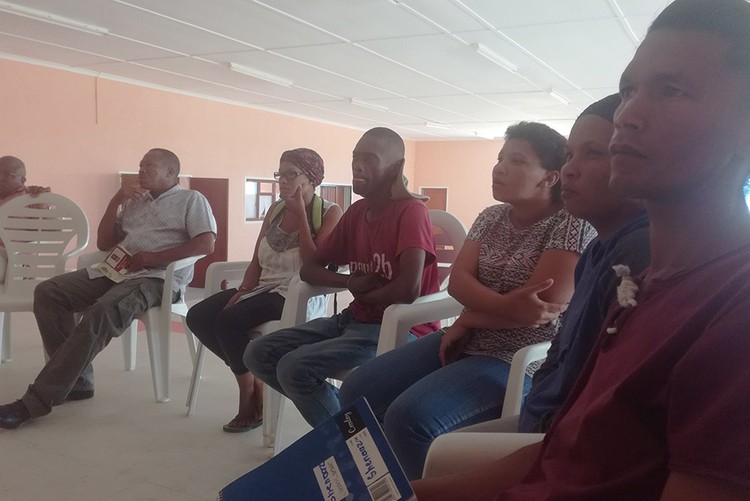
Community leaders from Lutzville Wes and surrounding townships raised several issues while attending the South African Human Rights Commission’s roadshow event last week. Photo: Barbara Maregele
21 November 2017
“If we live in rural farm areas, how can we get to the Human Rights Commission? There is no one here to protect us,” Davine Cloete, a community activists from Uitkyk, Lutzville in the Western Cape, told officials of the South African Human Rights Commission (SAHRC).
Cloete was speaking at one of the SAHRC’s roadshow events last week. The Commission visited small towns in the Namakwa and West Coast district municipalities to educate leaders in rural towns and to “make the SAHRC more accessible” to these communities.
Cloete asked why the event at the Lutzville Wes community hall had not been better publicised. She urged the Commission to return next year to hear complaints by residents, particularly those working on farms and nearby mines.
“Why didn’t you put up posters to notify more people about the roadshow? We as leaders came here not knowing about this engagement. We represent groups of small-scale farmers. We know it’s very difficult for people to access channels like this, so we will be happy if you come back again,” she said.
The Commission’s Northern Cape officer, Xolisa Mjekula, said reaching rural areas “is one of our big challenges” because the Commission only has one office in each province.
“Another challenge is that we tried to invite as many leaders that we knew about but people do not attend. I understand the concern that our office [in the Western Cape] is in Cape Town … In the new year we’ll agree on a date [to return],” he said.
During the discussion, Gert Brandt, a community leader in Lutzville Wes, told the group about a footpath closed by a local farmer. “Our community has been using that footpath for years. Two years ago, when the farmer started planting on a vacant piece of land near the path, he said it was his private road and stopped us from using it,” he said.
“We used to move freely through there. If the bridge here is flooded, then all the cars and people use that path as an alternative route,” he said.
Sara Tieties asked what her rights were after she was “unfairly” fired from her job. “I was working there for five years. One day they told me there was no more work for me and sent me home. Two days later, I saw another women there doing my job. Can I go back and demand my job back?” she asked.
Western Cape Human Rights Advocacy Programme Officer Julian Masimila said Tieties’ case was not unusual. “Most of the issues raised by people during the roadshow were predominantly about unfair labour practices on farms. We will be taking some of these cases back to our legal team. This is a sad reality and it means that there’s still a lot of work for us as the Commission to do to make people aware that their rights are being violated,” he said.